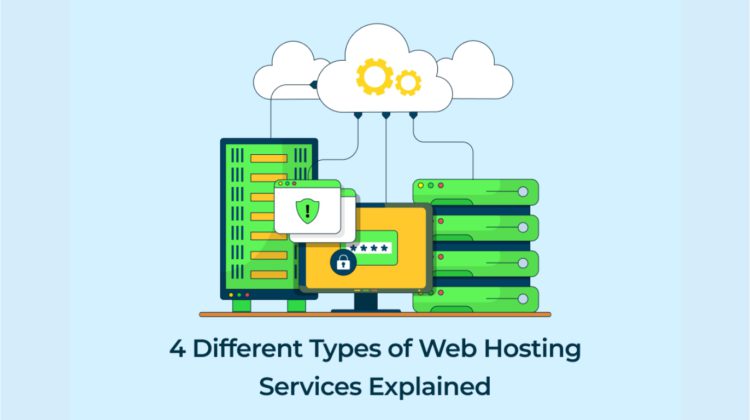
4 Types of Website Hosting Services Explained
Types of Website Hosting Services Explained: A Comprehensive Guide
When creating a website, one of the crucial decisions you’ll need to make is the type of hosting service to use. The right hosting services can significantly impact your website’s performance, reliability, and scalability. In this article, we’ll explore the different types of website hosting services, their pros and cons, and help you determine the best fit for your specific needs.
Shared Hosting
Shared hosting is the most affordable and beginner-friendly option. This type of hosting service allows your website to share server resources with multiple other websites. This makes it a cost-effective choice, especially for small businesses and personal websites.
Pros:
- Cost-effective: Shared hosting is the most budget-friendly option.
- Easy to use: Most shared hosting providers offer user-friendly control panels that simplify website management.
- Minimum technical knowledge is required: Shared hosting is suitable for those with limited technical expertise.
- Suitable for small websites: It’s ideal for websites with low to moderate traffic.
Cons:
- Performance limitations: Shared resources can sometimes lead to slower loading times, especially during peak traffic periods.
- Security concerns: Your website’s security may be compromised if other websites on the shared server are compromised.
- Limited control: You have less control over server settings and configurations.
- Scalability challenges: Shared hosting may not be suitable for websites with rapidly growing traffic or resource-intensive applications.
VPS Hosting
Virtual Private Server (VPS) hosting provides a dedicated portion of a server’s resources, offering more control and performance than shared hosting. It’s a beneficial option for businesses that require more flexibility and resources.
Pros:
- Better performance: VPS hosting provides more dedicated resources, leading to improved website speed and reliability.
- Increased control: You have more control over server settings and configurations.
- Scalability: You can easily scale up or down VPS hosting to accommodate changing traffic and resource needs.
- Root access: You have root access to the server, allowing for greater customization.
Cons:
- Higher cost: VPS hosting is generally more expensive than shared hosting.
- Technical knowledge is required: Managing a VPS necessitates more technical expertise than shared hosting.
- Maintenance responsibilities: You’re responsible for maintaining and updating the server operating system and software.
Dedicated Hosting
Dedicated hosting services provides you with an entire server for your website’s exclusive use. This offers the highest level of control, performance, and security. It’s ideal for large websites with heavy traffic or demanding applications.
Pros:
- Ultimate control: You have complete control over the server, allowing for maximum customization and optimization.
- Optimal performance: Dedicated hosting provides the best possible performance for your website.
- Security: Dedicated hosting provides the highest level of security because it isolates your website from other websites.
- Scalability: You can easily scale up or down dedicated hosting to meet changing needs.
Cons:
- Highest cost: Dedicated hosting is the most expensive option.
- Technical expertise is required: Managing a dedicated server necessitates significant technical knowledge.
- Maintenance responsibilities: You’re responsible for all server maintenance and updates.
Must Read: Exploring Fully Managed vs Self Managed VPS Hosting
Cloud Hosting
Cloud hosting is a scalable and flexible option that utilizes a network of servers to distribute your website’s workload. It offers automatic scaling, high availability, and redundancy, making it a reliable choice for businesses of all sizes.
Pros:
- Scalability: Cloud hosting can automatically scale up or down to accommodate fluctuating traffic and resource demands.
- High availability: Your website is less likely to experience downtime due to redundancy and automatic failover.
- Flexibility: Cloud hosting offers a wide range of features and customization options.
- Cost-effective: Cloud hosting can be cost-effective, especially for businesses that experience fluctuating traffic.
Cons:
- Potential for higher costs: While cloud hosting can be cost-effective, it can also become expensive if not managed properly.
- Required technical knowledge: Understanding and managing cloud hosting requires some technical expertise.
- Vendor lock-in: Relying heavily on a specific cloud provider can create vendor lock-in.
Choosing the Right Hosting Service
The best hosting service for your website depends on several factors, including:
- Website size and traffic: Consider the expected traffic volume and resource requirements of your website.
- Budget: Determine your budget for hosting expenses.
- Technical expertise: Assess your level of technical knowledge and comfort with managing server administration.
- Scalability needs: Consider how your website’s needs may change over time.
- Security requirements: Evaluate the security needs of your website and the level of protection offered by different hosting options.
By carefully considering these factors, you can choose the most appropriate hosting service to support your website’s growth and success.



